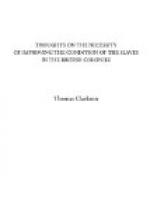the slave trade was abolished by England, and it is
therefore to be presumed, that no new slaves have
been imported into the British colonies within that
period. The slaves, therefore, who are there at
this day, must consist either of Africans, whose spirits
must have been long ago broken, or of Creoles born
in the cradle and brought up in the trammels of slavery.
What argument then can be produced for the continuation
of a barbarous discipline there? And we are very
glad to find that two gentlemen, both of whom we have
had occasion to quote before, bear us out in this
remark. Mr. Steele, speaking of some of the old
cruel laws of Barbadoes, applies them to the case
before us in these words:—“As, according
to Ligon’s account, there were not above two-thirds
of the island in plantations in the year 1650, we
must suppose that in the year 1688 the great number
of African-born slaves brought into the plantations
in chains, and compelled to labour by the terrors
of corporal punishment, might have made it appear
necessary to enact a temporary law so harsh as the
statute No. 82; but when the great majority
of the Negroes were become vernacular, born in
the island, naturalized by language, and familiarised
by custom, did not policy as well as humanity
require: them to be put under milder conditions,
such as were granted to the slaves of our Saxon ancestors?”
Colonel Malenfant speaks the same sentiments.
In defending his plan, which he offered to the French
Government for St. Domingo in 1814, against the vulgar
prejudice, that “where you employ Negroes you
must of necessity use slavery,” he delivers
himself thus:—“[18]If all the Negroes
on a plantation had not been more than six months
out of Africa, or if they had the same ideas concerning
an independent manner of life as the Indians or the
savages of Guiana, I should consider my plan to be
impracticable. I should then say that coercion
would be necessary: but ninety-nine out of every
hundred Negroes in St. Domingo are aware that they
cannot obtain necessaries without work. They
know that it is their duty to work, and they are even
desirous of working; but the remembrance of their cruel
sufferings in the time of slavery renders them suspicious.”
We may conclude, then, that if a cruel discipline
was not necessary in the years 1790 and 1794,
to which these gentlemen allude, when there must have
been some thousands of newly imported Africans
both in St. Domingo and in the English colonies, it
cannot be necessary now, when there have been
no importations into the latter for fifteen years.
There can be no excuse, then, for the English planters
for not altering their system, and this immediately.
It is, on the other hand, a great reproach to them,
considering the quality and character of their slaves,
that they should not of themselves have come forward
on the subject before this time.




